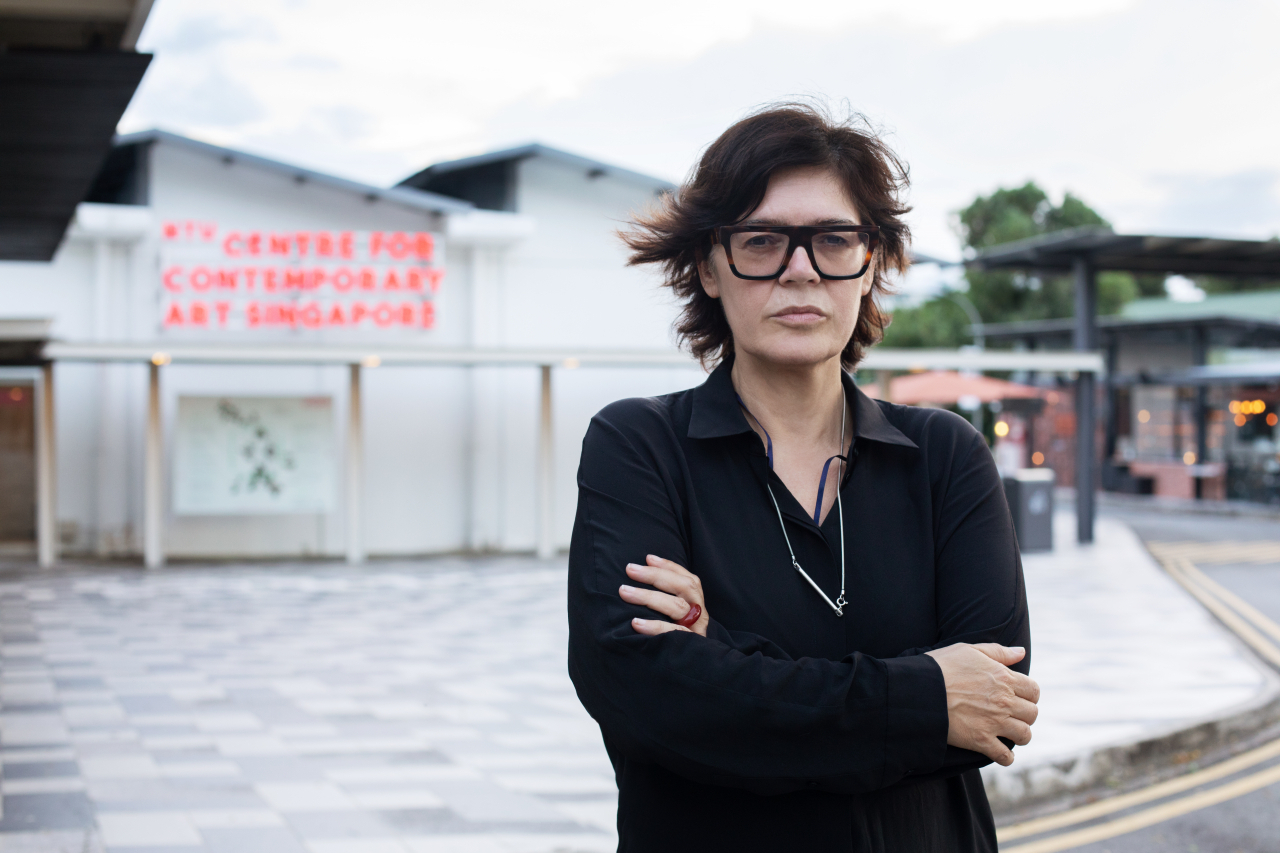 |
Ute Meta Bauer, artistic director of 2024 Diriyah Contemporary Art Biennale (Christine Fenzl) |
How do we live in changing times is a question that the Diriyah Contemporary Art Biennale, which runs Feb. 20 through May 24 in Saudi Arabia, seeks to ask.
Taking place at the historic town of Diriyah, just outside the capital Riyadh and home to the UNESCO World Heritage site of At-Turaif, the biennale will feature 92 artists from 43 countries, including 30 artists from the Gulf region, according to a press release issued by the biennale Wednesday.
“We face climate change, political tensions. How do we deal with these?” Ute Meta Bauer, the biennale’s German-born artistic director, asked rhetorically in talking about the second Diriyah Contemporary Art Biennale in a Zoom interview with The Korea Herald last week, ahead of the announcement of the artist lineup on Wednesday. Engaging with each other, doing something together and having conversations together are ways to find answers to the pressing issues of the day, she suggested.
Bauer has been the founding director of the NTU Center for Contemporary Art Singapore since 2013 and a professor in the School of Art, Design and Media at Nanyang Technological University in the city state. She has also been involved with the Gwangju Biennale in Korea.
“Compared to the previous edition where 50 percent of the artists were from Saudi Arabia, one-third of the artists will be from the Gulf region and two-thirds international,” said Bauer.
The inaugural biennale was held December 2021 to March 2022 and was visited by over 100,000 people. The event is organized by the Diriyah Biennale Foundation which also organizes the Islamic Arts Biennale in Jeddah in alternate years.
For the first time, foreign artists have been commissioned to create works for the biennale. Ahmed Mater, a prominent Saudi artist, will team up with Berlin-based photographer and filmmaker Armin Linke, to travel across the country documenting Saudi futurism since the 1940s.
Saudi-based, Yemeni artist Sara Abdu has been commissioned to create towers built with artisanal bars of soap that explore the cleansing rituals in the region. Meanwhile, Saudi artist Mohammad AlFaraj will present a work that incorporates palm trees and sound, reflecting upon the landscape of his home, Al Ahsa, one of the world’s largest oases.
The title of the biennale, “After Rain,” reflects a sense of revitalization and renewal. The title also reflects the changes that are afoot in Saudi Arabia as well.
Saudi Arabia and contemporary art, in the minds of most people, are not words that go hand in hand. It is a new notion not only for people outside the country but for the Saudis themselves as well, according to Bauer.
Yet, the country does have a strong art scene, albeit one that has been developing pretty much in isolation from the rest of the world. After all, it was only in 2019 that the kingdom opened its doors to international travelers as part of the Saudi Vision 2030, a program announced in 2016 that calls for sweeping changes.
Saudi women are well-represented in the art scene, Bauer noted. “The first artist I met was a woman and it helped me understand their position. They have such strong bodies of work, are very confident and come from different generations,” Bauer said.
Addressing the issue of censorship, Bauer said,
“Artists always find a way to sound their voice. Censorship is nothing new,” noting red flags are present in every country.
Nevertheless, there are somethings that must be said.
“How can we live respectfully together? This is a message we have to say no matter what,” she said.
Contemporary art show is new for everyone in the country and the government is trying to figure out what can be “digested,” Bauer explained. “There are diverse opinions and we are trying to open the door with the biennale,” she said. “We want to push boundaries but need to do it very carefully. This is new for everyone,” she said.
There are things that are strictly off-limits for Bauer as the artistic director of the Diriiyah biennale, however.
One is nudity, out of respect for the body, and the other, religion.
“I would be nervous to touch on religion. But it is out of respect more than censorship,” she said.
The biennale is an opportunity for Saudi Arabia and the world to engage, Bauer explained.
“There is an ambition to say ‘We are here. We want to have a conversation,’” Bauer said, adding, “It is important for people to come and make up their own minds.”
As for the potential impact of the Israel-Hamas war on the biennale, Bauer said everyone is conscious of it.
“How it will play out, we don’t know. But it is on our minds,” she said.







![[Herald Interview] How Gopizza got big in India](http://res.heraldm.com/phpwas/restmb_idxmake.php?idx=644&simg=/content/image/2024/11/20/20241120050057_0.jpg)